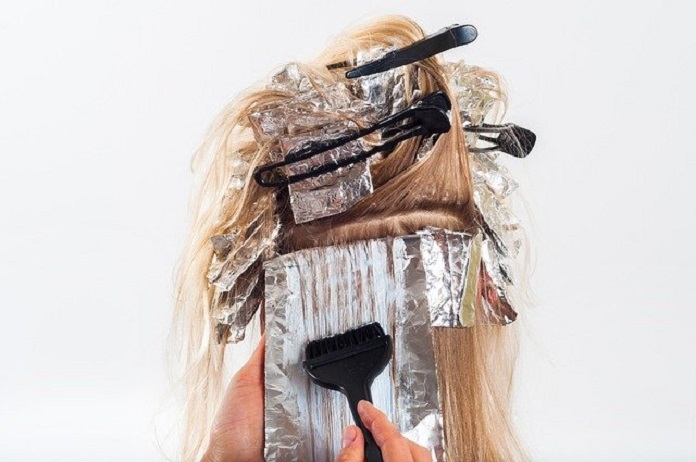A recent study carried out in the United States did not find a significant link between hair dyes and most cancers.
The use of permanent hair dyes is common in modern societies. In Europe and the United States, 50-80% of women and 10% of men above the age of 40 use hair dye. The wide-use of these products has some concerned about whether tehy are really involved in contributing to causing cancer. The World Health Organization’s International Agency for Research on Cancer have labelled occupational exposure to hair dyes as a probable carcinogen (cancer-causing agent). Hairdressers and barbers are at higher risk than consumers as they are exposed to higher doses of the chemicals in hair dyes.
There is public concern regarding the carcinogenic potential of hair dyes due to the unknown risk from personal use of hair dyes. The US Food and Drug Administration, as well as the International Agency for Research on Cancer, are constantly observing the long-term effects and safety of hair dyes. Hematopoietic cancer, bladder cancer, breast cancer, and lung cancer are the most frequently investigated cancer subtypes in relation to the use of hair dyes.
Permanent hair dyes are the most aggressive type
Types of hair dyes include oxidative (permanent), direct (semi-permanent), and natural. Permanent hair dye is the most used modern hair dye, with a share of 80% in Europe and the United States. Permanent hair dye products are the most aggressive type since the colour change will remain until the hair is replaced by new growth. Permanent hair dyes generally consist of intermediates and couplers, which are made up of aromatic amines. Personal use of permanent hair dyes leads to exposure to hair dye chemicals both by absorption through the skin and exposure to fumes.
Analysis of nurses who use permanent hair dyes
An ongoing Nurses’ Health Study can be used to help answer the question, ‘does hair dye really cause cancer?’. The cohort consisted of 117,200 eligible women, who enrolled in 1976 and have been followed up for 36 years. The participants were healthy female nurses between the ages of 30 and 55 at the beginning of the investigation.
The cohort were assessed using questionnaires, which were taken every two to four years. Questions included “Do you use a permanent hair dye currently?” and “How often do you currently use permanent hair dyes?”. Individuals who had used permanent hair dye at any stage were classified as ever users, and those who had no exposure to hair dyes were labelled non-users.
Duration and frequency of use of permanent hair dyes were calculated. For accurate results, the research team assessed age, race, natural hair color, body mass index, smoking status, and alcohol consumption in participants who were diagnosed with cancer.
No significant association between hair dyes and most cancers
The latest results from the Nurses’ Health Study was published in the British Medical Journal.
During 36 years of follow-up, 20,805 solid cancers, 1,807 hematopoietic cancers, 22,560 basal cell carcinomas, and 2,792 cutaneous squamous cell carcinomas were reported. Dr Yin Zhang, who led the research, stated, “We observed no positive association between personal permanent hair dye use and risk of most cancers or cancer-related mortality.”
There was no increased risk of most cancers in women who use permanent hair dyes, including bladder, brain, colon, kidney, lung, blood, or immune system cancer. There were no significant increases in the risk of developing solid cancers, hematopoietic cancers, or even cancer-related deaths.
Interestingly, a lower risk of brain cancer and chronic lymphocytic leukemia or small lymphocytic lymphoma was found in women who used permanent hair dyes. Women with naturally dark hair who used permanent hair dyes had a lower risk of developing lung cancer compared with non-users.
Hair dyes increase the risk for certain cancer types
Personal use of permanent hair dyes was associated with a slight increase in the risk for basal cell carcinoma, ovarian cancer, and some forms of breast cancer (estrogen receptor-negative, progesterone receptor-negative, or hormone receptor-negative).
Hair dyes were found to increase the risk of developing basal cell carcinoma, which is the most common type of skin cancer, in women with naturally light hair. There is also a potentially increased risk of ovarian cancer with longer latency in women with naturally light hair.
An increased risk for Hodgkin lymphoma was detected in women with naturally dark hair. This is a novel finding and the reason for it is unclear, although it may be due to a higher concentration of complicated and problematic chemicals in darker dyes.
What is the next step?
The Nurses’ Health Study offers some reassurance that there is only a limited association between the personal use of permanent hair dyes and increased cancer risk. However, the relationship between dye use and cancer risk and mortality requires further exploration due to the mixed results seen in this study. Dr Zhang added, “Current evidence regarding the carcinogenic potential of personal use of permanent hair dyes are not conclusive and further investigations are needed.”
The American Chemical Society does not recommend any specific medical advice for current or former hair dye users. Dr Zhang suggests carefully following instructions to limit potential risk, such as “using gloves, keeping track of time, and rinsing the scalp thoroughly with water after use.”
Written by Albina Babu, MSc
References:
Zhang, Y., et al. (2020). Personal use of permanent hair dyes and cancer risk and mortality in US women: prospective cohort study. BMJ, 370. Retrieved from: https://www.bmj.com/content/370/bmj.m2942
No link between permanent hair dyes and cancer: study (2020). HealthDay. Retrieved from: https://consumer.healthday.com/cosmetic-information-8/hair-and-scalp-problems-news-341/no-link-between-permanent-hair-dyes-and-cancer-study-760980.html
Image by Arturs Budkevics from Pixabay



